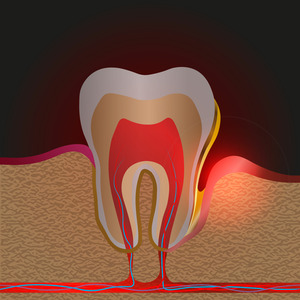
If you have been diagnosed with gum disease, your periodontist may use a few terms that you’re not familiar with. In particular, they may tell you that periodontal pockets have formed. But what exactly does this mean? Below is a quick overview of what you need to know about periodontal pockets and how to deal with them.
What are Periodontal Pockets?
The term “periodontal pocket” refers to empty space that has formed between the teeth and the gums. This is typically a consequence of gum disease being allowed to reach its more advanced stages, which can cause the gum tissue to pull away from the teeth.
One of the biggest downsides of periodontal pockets is that the space is a perfect target for harmful oral bacteria, causing plaque and tartar to form in an area that is often difficult to clean. Over time, this can lead to the weakening of the underlying bone, causing your teeth to come loose.
How Can Periodontal Pockets Be Treated?
Your periodontist can recommend a treatment for your periodontal pockets based on how severe the issue is. In many cases, they may recommend scaling and root planing in order to get rid of the plaque and tartar hiding under the gums. Antibiotics may also be prescribed to fight the infection in your gum tissue. In particularly advanced cases, surgery might be needed.
What Can You Do to Prevent Periodontal Pockets?
If you don’t want to have to worry about dealing with the long-term consequences of periodontal pockets, the best thing you can do is take whatever steps are necessary to protect your smile from gum disease. Here are some important steps for maintaining excellent gum health:
- Make a point of brushing at least two times a day, and don’t forget to clean the gum line.
- Switch to toothpaste that is designed to help keep tartar under control.
- Floss gently to clean the spaces between your teeth that you wouldn’t be able to reach with a toothbrush.
- Start using mouthwash that has antibacterial properties.
- Visit your regular dentist two times a year. (Cleanings performed by a professional are the most reliable way to get rid of any tartar that has built up in your mouth.)
Are you worried about periodontal pockets or other consequences of gum disease? You should schedule a consultation with your periodontist as soon as you can; they can work with you to create a plan for restoring and protecting the health of your gums.
About the Author
Dr. David Handsman went to Temple University for his Doctor of Dental Medicine, and he earned a Masters of Dental Surgery in periodontology at the University of Tennessee. He can use scaling and root planing to treat gum disease and reduce the size of periodontal pockets. To schedule a consultation with Dr. Handsman at Handsman & Haddad Periodontics in Worcester, visit his website or call (508) 753-5444.

